List of World Heritage Sites in Croatia
There are seven UNESCO World Heritage Sites in Croatia.[1]
World Heritage Sites
| Image | Name | Location | UNESCO data | Description |
|---|---|---|---|---|
| |
Plitvice Lakes National Park | Plitvička Jezera | 98; 1979; Natural; (vii, viii, ix) |
Over time, water has flown over the natural limestone and chalk, creating natural dams which in turn have created a series of connecting lakes, waterfalls and caves. The nearby forests are home to bears, wolves and many rare bird species. |
.jpg) |
Historical Complex of Split with the Palace of Diocletian | Split | 97; 1979; Cultural; (ii, iii, iv) |
The palace was built by the Roman emperor Diocletian at the turn of the fourth century AD, and later served as the basis of the city of Split. A cathedral was built in the Middle Ages inside the ancient mausoleum, along with churches, fortifications, Gothic and Renaissance palaces. The Baroque style makes up the rest of the area. |
| |
Old City of Dubrovnik | Dubrovnik | 95; 1979; Cultural; (i, iii, iv) |
Dubrovnik became a prosperous Maritime Republic during the Middle Ages, it became the only eastern Adriatic city-state to rival Venice. Supported by its wealth and skilled diplomacy, the city achieved a remarkable level of development, particularly during the 15th and 16th centuries. |
 |
Episcopal Complex of the Euphrasian Basilica in the Historic Centre of Poreč | Poreč | 809; 1997; Cultural; (ii, iv) |
The episcopal complex, with its striking mosaics dating back to the 6th century, is one of the best examples of early Byzantine art and architecture in the Mediterranean region and the world. It includes the basilica itself, a sacristy, a baptistery and the bell tower of the nearby archbishop's palace. |
| |
Historic city of Trogir | Trogir | 810; 1997; Cultural; (ii, iv) |
Trogir's rich culture was created under the influence of old Greeks, Romans, and Venetians. It is the best-preserved Romanesque-Gothic complex not only in the Adriatic, but in all of Central Europe. Trogir's medieval core, surrounded by walls, comprises a preserved castle and tower and a series of dwellings and palaces from the Romanesque, Gothic, Renaissance and Baroque periods. |
 |
Cathedral of Saint James | Šibenik | 963; 2000; Cultural; (i, ii, iv) |
The cathedral is a triple-nave basilica with three apses and a dome (32 m high inside) and is also one of the most important Renaissance architectural monuments in the eastern Adriatic. |
 |
Stari Grad Plain | Hvar | 1240; 2008; Cultural; (ii, iii, v) |
The Stari Grad Plain is an agricultural landscape that was set up by the ancient Greek colonists in the 4th century BC, and remains in use today. The plain is generally still in its original form. The ancient layout has been preserved by careful maintenance of the stone walls over 24 centuries. |
| |
Stećci Medieval Tombstones Graveyards | Dubravka, Cista Velika | 1504; 2016; Cultural; (iii, vi) |
Stećak or the medieval tombstones are the monolith stone monuments found in the regions of the present Bosnia and Herzegovina, parts of Serbia, Montenegro and Croatia. The available sources suggest that they appear from the second half of the 12th century, then last through the 13th century and are intensively made and decorated in the 14th and 15th centuries. But in the 16th century they completely cease. Out of 70,000 recorded tombstones from about 3,300 sites, some 60,000 are in Bosnia and Herzegovina, about 4,400 in Croatia, about 3,500 in Montenegro and some 4,100 in Serbia. The elementary tombstone groups are the laid and the upright stone monoliths. |
Tentative List
The following sites are on the Tentative List for Croatia, meaning that the government intends to consider them for nomination in the future:[2]
| Image | Name | Location | UNESCO data |
|---|---|---|---|
 |
Zadar - Episcopal complex | Zadar County | 157; 2005; Cultural; (i)(ii)(iii)(iv)(vi) |
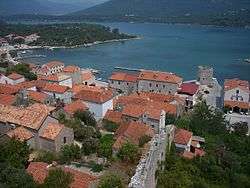 |
Historical-town planning ensemble of Ston with Mali Ston, connecting walls, the Mali Ston Bay nature reserve, Stonsko Polje and the salt pans | Dubrovnik-Neretva County | 160; 2005; Cultural; (i)(iii)(iv)(v) |
| |
Historical-Town Planning Ensemble Tvrđa (Fort) in Osijek | Osijek-Baranja County | 161; 2005; Cultural; (i)(iv)(vi) |
| |
Varaždin - Historic Nucleus and Old Town (the Castle) | Varaždin County | 162; 2005; Cultural; (i)(iii)(iv)(vi) |
| |
Burg - Castle of Veliki Tabor | Krapina-Zagorje County | 1167; 2005; Cultural; (iv) |
.jpg) |
Lonjsko Polje Nature Park | Sisak-Moslavina County | 2012; 2005; Mixed |
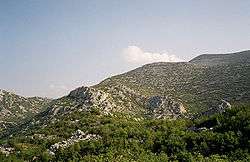 |
Velebit Mountain | Lika-Senj County and Zadar County | 2013; 2005; Natural; (vii)(viii)(ix)(x) |
| Frontiers of the Roman Empire Croatian Limes | 2014; 2005; Cultural; (i)(ii)(iii)(iv)(v) | ||
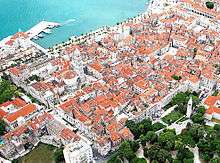 |
Diocletian's Palace and the Historical Nucleus of Split (extension) | Split-Dalmatia County | 2015; 2005; Cultural; (i)(ii)(iii)(iv)(v) |
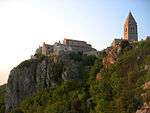 |
Lubenice | Primorje-Gorski Kotar County | 2017; 2005; Cultural; (v) |
| Primošten Vineyards | Šibenik-Knin County | 5102; 2007; Cultural; (v)(vi) | |
 |
Hermitage Blaca | Split-Dalmatia County | 5103; 2007; Cultural; (ii)(v) |
 |
City of Motovun | Istria County | 5104; 2007; Cultural; (ii)(iv) |
 |
The historic town of Korčula | Dubrovnik-Neretva County | 5105; 2007; Cultural; (ii)(iii)(iv)(v) |
 |
Kornati National Park and Telašćica Nature Park | Šibenik-Knin County and Zadar County | 5106; 2007; Natural; (vii)(viii)(x) |
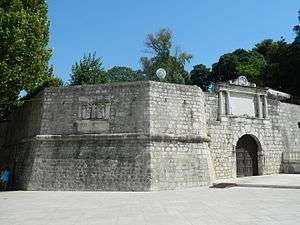 |
The Venetian Works of defence between 15th and 17th centuries | Zadar County, Šibenik-Knin County and Dubrovnik-Neretva County | 5846; 2013; Cultural; (ii)(iii)(iv) |
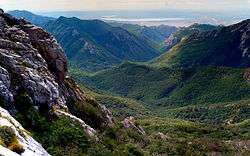 |
Extension to the Joint World Heritage Property "Primeval Beech forests of the Carpathians (Slovak Republic and Ukraine) and the Ancient Beech forests of Germany (Germany)" | Lika-Senj County | 6017; 2015; Natural; (ix) |
See also
- World Heritage Site
- Register of Protected Natural Values of Croatia
- Register of Cultural Goods of Croatia
- UNESCO Intangible Cultural Heritage Lists
References
- ↑ Croatia: Properties inscribed on the World Heritage List, UNESCO, retrieved 2010-03-06
- ↑ "Tentative Lists: Croatia". UNESCO. Retrieved 11 May 2010.
External links
This article is issued from Wikipedia - version of the 10/2/2016. The text is available under the Creative Commons Attribution/Share Alike but additional terms may apply for the media files.
